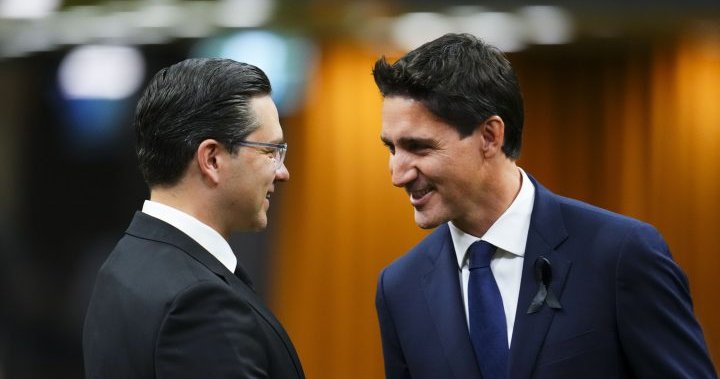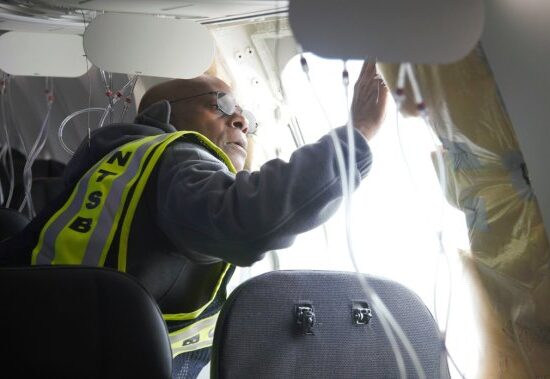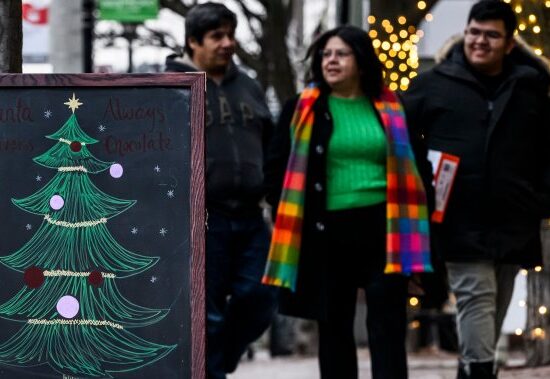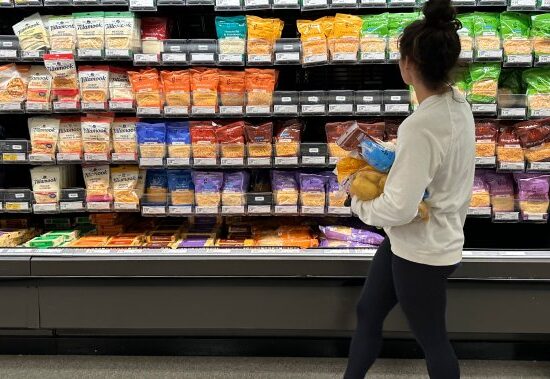
The gridlock between Liberal and Conservative supporters appears to have broken, new polling suggests, with the Tories edging slightly ahead.
In an Ipsos poll conducted exclusively for Global News and released Tuesday, 37 per cent of Canadians said they would vote for Pierre Poilievre’s Conservative Party, signalling a four-point jump since February.
If a federal election were to take place tomorrow, the Liberals would fall behind with 32 per cent of votes, which is one point lower than they got four months ago, when Ipsos last conducted their poll.
Since 2019, the Liberals and the Conservatives have been “locked in a logjam,” but this is the first time that Ipsos polling has shown either side being able to really break out, said Darrell Bricker, global CEO of Ipsos public affairs.
He said the poll was reflecting “fatigue” with the Liberal government more so than growing support for the Conservatives.
“People are really not that happy with the direction of the country at the moment and they lay a lot of the blame for that right now on the Trudeau administration,” Bricker said.
“So I think that less than Poilievre actually attracting a lot of people, it’s really people taking a look because they’re really not satisfied with the current situation with the federal government.”

Canada’s two main federal parties held onto their seats in federal byelections that took place in Ontario, Manitoba and Quebec last month. But as pollsters had predicted, some of the races were tighter than in past elections.
Support for the New Democratic Party, led by Jagmeet Singh, also appears to have waned, with 16 per cent of respondents saying they would vote NDP – a drop of two points.
The New Democrats entered into a governance deal with the Liberal minority government in March 2022, agreeing to back the Liberals on key votes in the House of Commons until June 2025 as long as key priorities such as dental care move ahead.
Bricker said it’s difficult for the NDP to stand out from the government at the moment because they are so aligned with the Liberals.
“If you want change, the NDP is probably not the place that you’re going to look for it right now. So that’s also benefiting the Conservatives.”

Meanwhile, the Bloc Quebecois would get eight per cent of the national vote, followed by the Green Party claiming three per cent and the People’s Party getting two per cent, the Ipsos poll showed.
One in 10 Canadians were indecisive about their voting intention, while six per cent said they would either abstain from casting their ballot or would spoil their vote.
Since a Liberal minority government was elected in 2019 and then again in 2021, voting intentions among Canadians have remained largely neck-and neck with the Conservatives.
Regionally, the Tories solidified their support base in Western Canada – British Columbia, Alberta, Saskatchewan and Manitoba, the Ipsos poll showed. The Liberals fared better than the other parties in Quebec and the Atlantic provinces.
In the country’s most populous province, Ontario, the Liberals and Conservatives would each get around 38 per cent if an election were held tomorrow.
Continuing with the same trend as past polling, Liberals saw roughly equal support among men and women, while Conservatives had stronger backing by male voters than female voters.
Conservative support was fairly similar across different age groups, but loyalty increased among high-income voters.
Liberals had greater appeal among older voters and their support was evenly spread out among different income levels.
Bricker said younger voters appear to be a bit more “promiscuous” in their voting intentions and are increasingly leaning towards the Tories.
“One of the things that seems to be changing a little bit is disaffection among younger voters, so we see younger voters actually taking more of a look at the Conservative Party than they were in the past.”
These are some of the findings of an Ipsos poll conducted between June 19 and 20, 2023, on behalf of Global News. For this survey, a sample of 1,000 Canadians aged 18+ was interviewed. Quotas and weighting were employed to ensure that the sample’s composition reflects that of the Canadian population according to census parameters. The precision of Ipsos online polls is measured using a credibility interval. In this case, the poll is accurate to within ± 3.5 percentage points, 19 times out of 20, had all Canadians aged 18+ been polled. The credibility interval will be wider among subsets of the population. All sample surveys and polls may be subject to other sources of error, including, but not limited to coverage error, and measurement error.
© 2023 Global News, a division of Corus Entertainment Inc.
















